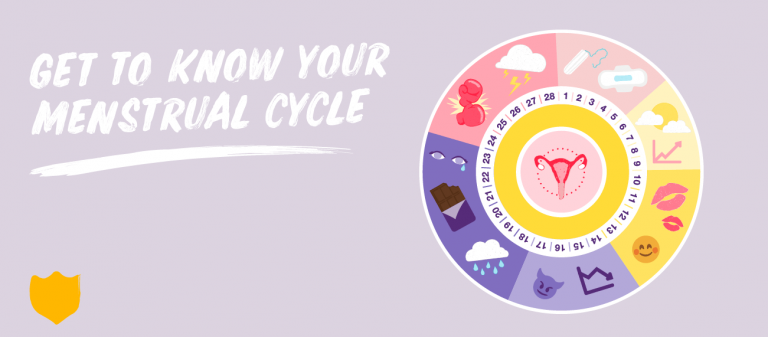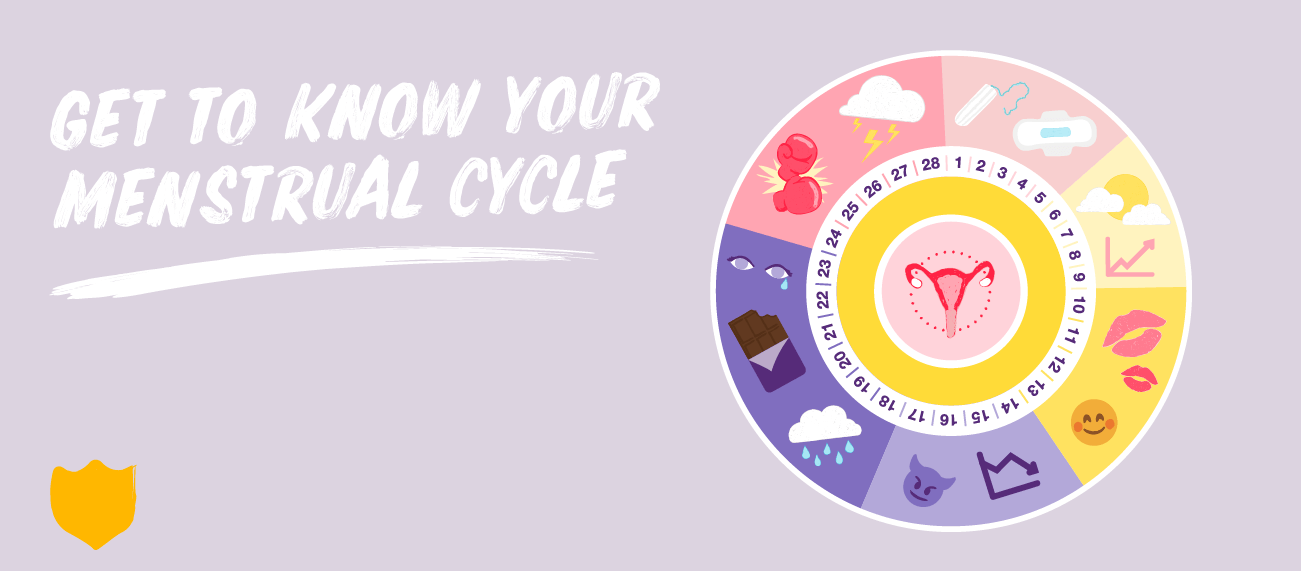Welcome to your menstrual cycle. It’s something that nearly 50% of people experience, but do you really know what’s happening to your body every month?
ellaOne is explaining your cycle from start to finish so you can better understand your body. Every woman is different and no two cycles will be the same, even your own cycle can change from month to month, but here are the approximate stages of your cycle broken down in all their gory glory…
Day 1 – 5: There Will Be Blood
Let’s clear one thing up, your period is not your menstrual cycle: it’s just the first phase. Deborah Evans^, a pharmacist with over 30 years of experience, says: “The menstrual cycle is from the 1st day of your period until the day before your next period and can vary from woman to woman, and throughout a woman’s reproductive life.”
“The length of the menstrual cycle is on average 28 days but can be shorter or longer than this,” she continues, “regular cycles from 21 to 40 days, are considered ‘normal’ however what is normal for you might be different. The key is to be aware of anything that is not usual for you and, whilst there may not be anything wrong at all, it is worth getting it checked out.”
You don’t need us to tell you that the first day of your period can be pretty rough. At this stage in your cycle your levels of oestrogen are at their lowest.
Oestrogen is responsible for the production of serotonin, commonly known as the ‘happy hormone’ as it is known to boost your mood. When oestrogen is low, serotonin is low and as a result you can feel pretty terrible.
On top of this, a lot of people experience severe cramps at the start of their period. This is a result of the muscles in your uterus contracting to shed its lining. For some people these cramps can feel as though your womb is punching itself in the face over and over again.
Experts recommend staying hydrated and even doing some gentle exercise to help deal with cramps (good one, ‘experts’). If you’re not feeling up to a jog, you can’t go wrong by curling up with a hot water bottle and Netflix.
Day 6 – 9: Things are looking up
The first day of your period is also the first day of the next phase of your menstrual cycle: the follicular phase.
At the beginning of the follicular phase your body prepares for ovulation (egg release) by releasing follicle stimulating hormone (FSH). This is the hormone which helps with the development of eggs in the ovaries. By around day 6, a single egg in your ovaries becomes dominant and continues growing. Once this has happened, your levels of FSH decrease.
Of course at this stage, some women may still be on their period. Here’s the good news: while you’re ‘surfing the crimson wave’ your oestrogen levels are rising. This means, by the time your knickers stop looking like a crime scene, you’ll find you have more energy and your mood has vastly improved!
Many women find that during this stage of their cycle their skin is clearer, their hair is less greasy and they feel focused, confident and more energetic. In short, higher levels of oestrogen can make you feel pretty good!
Was this helpful?
Day 10 – 13: Damn Girl
You know when you go on a roller coaster and it climbs higher and higher right before a terrifying sheer drop on the other side? This part of the menstrual cycle is like that, except much less fun – we can’t imagine anyone queuing up to go on this ride.
All this time your oestrogen levels have been on the rise, making you feel like a boss-lady, until you reach this phase of your cycle. Ovulation hits and changes all that.
The high levels of oestrogen prompt the production of the luteinising hormone (LH). LH is the hormone which triggers the release of an egg from your ovaries to make its way to your uterus. “
When exactly do people ovulate? “Many women think ovulation occurs on day 14 and in the middle of the cycle, but it can be very unpredictable. Ovulation only happens on day 14 of a 28-day cycle in around only 12 per cent of cases,” she continues, “The variability of ovulation is large – it can happen from day 11 to day 21. If the cycle is not regular, there is a risk of ovulation happening even later in the cycle.”
The egg can survive for 12 to 24 hours, if it isn’t fertilised in this time it dissolves. Of course the date of ovulation can vary from month to month. It can be affected by all kinds of things from your diet, your stress levels or even traveling.
During ovulation your oestrogen levels fall faster than Jennifer Lawrence at the Oscars and progesterone increases. Progesterone is the hormone responsible for the lining of your uterus, the endometrium. The rise in progesterone is telling your uterus to start thickening this lining in preparation for a potential pregnancy.
Day 14 – 17: All Hell Breaks Loose
You know when you go on a roller coaster and it climbs higher and higher right before a terrifying sheer drop on the other side? This part of the menstrual cycle is like that, except much less fun – we can’t imagine anyone queuing up to go on this ride.
All this time your oestrogen levels have been on the rise, making you feel like a boss-lady, until you reach this phase of your cycle. Ovulation hits and changes all that. The high levels of oestrogen prompt the production of the luteinising hormone (LH). LH is the hormone which triggers the release of an egg from your ovaries to make its way to your uterus.
The egg can survive for 12 to 24 hours, if it isn’t fertilised in this time it dissolves. Of course the date of ovulation can vary from month to month. It can be affected by all kinds of things from your diet, your stress levels or even traveling.
During ovulation your oestrogen levels fall faster than Jennifer Lawrence at the Oscars and progesterone increases. Progesterone is the hormone responsible for the lining of your uterus, the endometrium. The rise in progesterone is telling your uterus to start thickening this lining in preparation for a potential pregnancy.
Day 18 – 23: You Won’t Like Me When I’m Hangry
Progesterone is a vital part of your menstrual cycle but this sudden change in hormones can generally leave you feeling a bit of wreck. It’s around this time that progesterone starts to feel like oestrogen’s evil twin, who has arrived to ruin your life.
As your progesterone levels rise you’ll experience a number of delightful changes. It’s common for your skin to break out, your hair to get greasier and for your breasts to ache. A lot of women feel bloated and tired around this time.
Once again experts have recommended exercise, healthy eating and staying hydrated. But sometimes, it’s just too much to fathom doing cardio when your boobs ache and you can’t stop crying over last night’s episode of Bake Off.
Self-care is of vital importance during this phase of your cycle. Your period is due next week making your metabolism fluctuate and as a result your body may demand an extra 250 – 350 calories. Eating healthily is always a good idea but if your body is telling you that you need a day in bed watching Titanic and eating a family-sized Dairy Milk, now is the time to embrace it.
Day 24 – 27: The Beginning Of The End
You know that feeling a few days before your next period when you feel like you want to punch anyone who disagrees with you – oh and anyone who tells you you’re overreacting and shouldn’t punch people?
Yeah, us too: it’s called premenstrual syndrome (PMS) and it’s the worst.
The rising progesterone contributes to the production of a hormone called cortisol which is often associated with anxiety and stress. So if you find yourself losing it at the smallest inconvenience, don’t worry – you don’t need anger management, you’re just full of cortisol.
How can you make PMS more bearable? “You can alleviate symptoms by taking regular exercise, eating a healthy balanced diet, getting plenty of sleep (7-8 hours), reducing stress through yoga, meditation or similar, taking painkillers such as ibuprofen or paracetamol and keeping a diary of symptoms for at least 2 cycles,” says Deborah.
“Avoid smoking or drinking too much. If the symptoms are interfering with your life, then see your GP who may recommend hormonal treatment such as the combined contraceptive pill and in some cases antidepressants,” she adds.
(Roughly) 28 Days Later
At last your period arrives, the cycle begins again and suddenly all the chocolate and angst makes sense.

What Are Irregular Periods?
“Irregular periods are when the length of the menstrual cycle (the time between periods) keeps changing and your period either comes early or late,” says Deborah, “most women develop a regular cycle with a similar length of time between periods after puberty, but it’s not uncommon for the gap to vary by a few days at a time.”
“The common causes of irregular periods are puberty (shortly after your periods start when periods can be irregular for a year or two), or when the menopause is starting (usually between the ages of 45 and 55), early pregnancy, some forms of hormonal contraception, extreme weight loss or gain, excessive exercise, stress and some medical conditions.”
“You should see a GP if things change for you or you have irregular periods and you are struggling to get pregnant,” she continues.
Get to know your menstrual cycle
Of course everyone’s cycle is different. Some people won’t experience half as many symptoms as others. Some periods are heavy while others are light and cycles vary in length from person to person. It’s amazing how little we are taught about what’s going on with our bodies. If you get to know your menstrual cycle you can prepare yourself for the various phases and their effects.
Take advantage of the oestrogen spike and the confidence it brings. Take care of yourself when PMS hits. And if you don’t want to get pregnant, always use contraception, especially when you’re at your most fertile and even during your period – because you can get pregnant any day of the year.
By Georgina Hoffman







